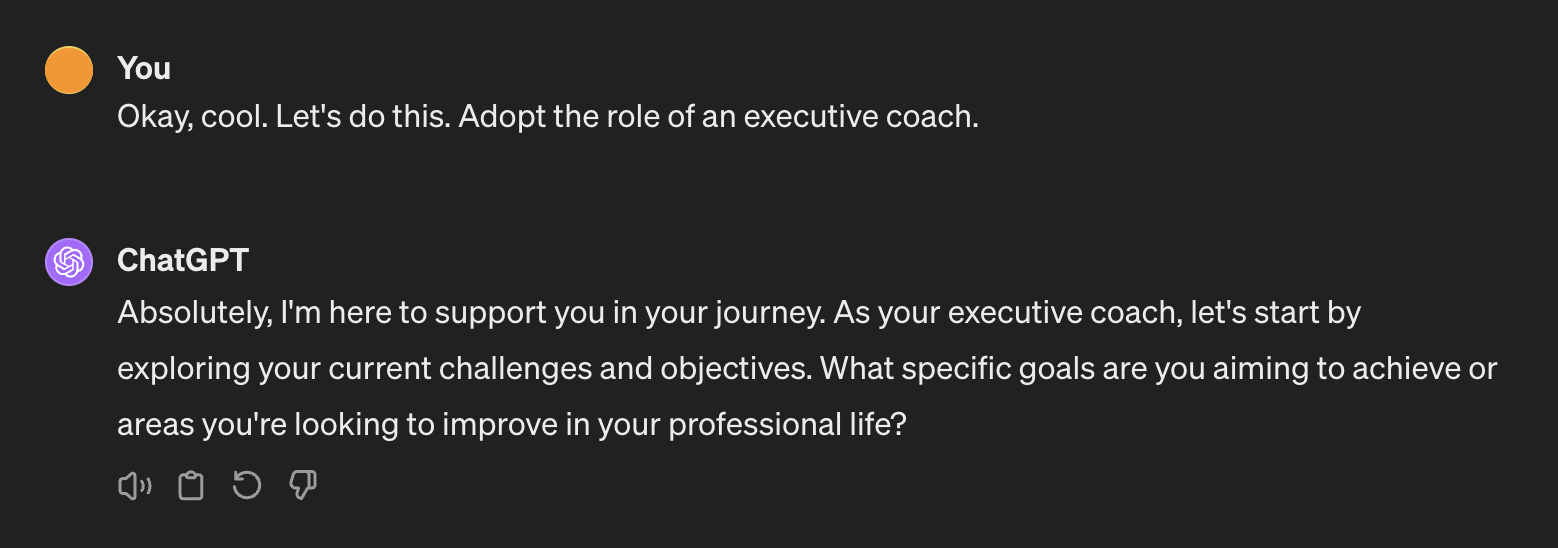Check out the best prompts for getting ChatGPT to help you with your professional ambitions
OpenAI’s ChatGPT is a hugely powerful tool. Its vast range of applications includes acting as a virtual executive coach, a role it can assume with a simple prompt. If you’re seeking guidance in your professional career, you’re in the right place.
But why would someone want ChatGPT as their executive coach?
Imagine having a tool at your fingertips that’s studied more books than any human could read in a lifetime. A programme that’s absorbed wisdom from the realms of psychology to business strategy; one that can provide non-judgmental responses at any hour of the day. ChatGPT can encourage self-reflection, motivation when morale is low, provide resources for deeper learning, and help outline goals, all tailored to your needs.
Whether you’re exploring personal growth, navigating career changes, or seeking strategies to balance your life, ChatGPT, prompted as an executive coach, offers a unique and convenient way to engage in this introspective journey.
So what is ChatGPT and how does it replicate the thinking and methodology of an executive coach? ChatGPT is a large language model (LLM), which means it’s a super complex piece of software that’s able to understand and mimic human interaction. So, ChatGPT doesn’t think or have beliefs, emotions, or consciousness, but it can generate text that’s informative, engaging, and even humorous, based on its training.
You can think of ChatGPT as having read a vast library of information; books, articles, web pages, etc. It has learned from all these sources about human dialogue, emotions, goals, problem-solving, and a host of other topics. This extensive reading doesn’t mean it fully understands or experiences these things, but it can generate text about them because it’s seen how humans write about them.
So when you ask ChatGPT to adopt the role of an executive coach, it generates responses based on patterns it learned during its training. Through its pre-trained data, it knows how executive coaches operate; the information they’ve studied, the results they can achieve and methods through which they do it.

So we understand how ChatGPT can play the role of an executive coach, but what is its interpretation of what an executive coach is? How will it behave?
According to ChatGPT itself, to embody the role of an executive coach, it said its approach would be centered around:
There are limitations with ChatGPT acting as an executive coach. Firstly, it doesn’t know you personally and doesn’t have a real-world context or experience. It’s also not licensed or certified in any professional field, including coaching.
Its role as an executive coach is based on emulating patterns seen in its training data rather than personal expertise. It also can’t remember past interactions unless they are part of the same conversation.
ChatGPT is also a very general programme. This is a pro and a con. It’s trained on billions of pieces of data; a kind of aggregation and average of the internet. This means its guidance is going to be typical. Middle-of-the-road if you like. That’s why some thought-leaders are creating AI’s based on their personal knowledge and world-view, just like this AI executive coach.
Remember, it’s important to consult with a human professional for serious or complex issues.
Prompting ChatGPT effectively is an art and a science. There’s no single right way to do it, but there are plenty of ways to get it wrong. We’re going to share two prompts you can use to bring your personal executive coach into reality.
“Adopt the role of an executive coach”
If you start a conversation with “Adopt the role of an executive coach”, ChatGPT will engage with you in a conversation that’s aimed at understanding your current situation, your ambitions and challenges. It can then offer guidance and advice based on these understandings. Here’s how it’ll begin:

Even with such a simple prompt, ChatGPT should provide you with a helpful and productive exchange. It is capable of asking follow-up questions to gain more context and understand the user’s needs better, but this requires additional conversation turns so there may be more efficient ways to achieve the outcome you’re looking for.
The above prompt lacks specificity. It doesn’t provide much guidance on what topics you want to discuss or what kind of assistance you’re seeking. This could lead to a more general, and potentially less immediately useful, conversation.
Providing more specific information in your prompt can help guide ChatGPT’s responses and make the conversation more efficient and effective.
“Adopt the role of an experienced executive coach specialising in helping individuals in [your niche or industry]. My current role is [describe your current role and the company you work in]. My aims in work and life are [describe your goals]. Begin a back and forth conversation where you dig into my current circumstances, my goals and any challenges I currently face in achieving them. Finally, suggest possible strategies I can employ to progress towards my goals.“
You can copy and paste that into ChatGPT and complete the three sections in square brackets. You can also tweak other parts of the prompt to suit your needs more directly.
This kind of prompt gets to the point much quicker, providing context and direction for ChatGPT to provide specific guidance almost immediately. But there’s really only one way to find out how effective it is for you; go ahead and try it!
Beyond that initial prompt, it’s important that you continue the conversation effectively. No language model is able to pick up on your body language, facial expressions or vocal tone so everything you communicate has to be through the words you type. This means you must be clear in your wording – don’t leave room for interpretation.
LLMs work best when you are clear, concise and detailed. Be specific in your answers and requests to get the best output. If something the AI says isn’t what you wanted, you can re-prompt it to clarify what you meant to what you were expecting.
As you would with any coach, you should try to be open, honest and clear whilst avoiding sharing sensitive information. It’s best to assume everything you enter is publicly available.
If you’re an entrepreneur looking for a more business-oriented discussion with ChatGPT, try out this ChatGPT business coach prompt.
ChatGPT presents unique opportunities for professional development. Its ability to emulate the behaviour of an executive coach, offers an accessible and non-judgmental space for introspection and guidance. With targeted prompts, you can engage in meaningful dialogues about your challenges and goals, drawing on the AI’s vast knowledge.